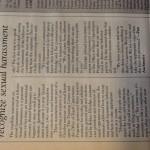Check it:
Monthly Archives: December 2012
randomness muhahahahaha
Who’s Afraid of Black Sexuality? from the Chronicle of Higher Education
Once again, we are on the cutting edge with the scholarship we are engaging in class. Take a look:
http://chronicle.com/article/Whos-Afraid-of-Black/135960/
Enjoy.
Remember Their Names from Crunk Feminist Collective
In light of our discussion on narratives of resistance, I post this:
Rape
Cases of sexual violence have been reported since the 1980s, but preventive efforts have been taken at Emory since 1977. On November 1, 1977, Emory’s Student Government Association aims at rape prevention. The Student Government Association is an extremely influential group at Emory University. And to see them taking a stand on a major issue in the world really says a lot about Emory’s take on sexual violence. The student representatives in SGA are truly making an effort to prevent problems they might have seen on campus.
Two years later, on October 30, 1979, there is a rape seminar at Emory, which educates students about various prevention methods. The next month, University women are told how to deal with rape and learn how serious it can be and that no place is safe at all. What defines rape has been a confusing matter. “In a very short time we moved from a climate in which rape was widely regarded as rare to one in which rape is regarded as a widespread social problem” [1]. These changing occurrences of rape have been noted and Emory definitely tries to act upon thing and solve problems with various programs.
A couple years later, on October 6, 1981, a speaker comes to Emory who speaks of subliminal seduction. They dissect numerous ads for his audience as he projects each one on screen. This introduces new ways people can be sexual abused. Emory is really trying to take innovative approaches in dealing with sexual violence.
In that same year in 1981, Emory’s Training Center and Hospital Education Services co-sponsored an hour long self-defense program. They hope this program will change the national attitude toward crime from one of fear to one of rational assessment. Emory’s policy on sexual harassment states that all employees should be able to enjoy a work and educational environment that is free from all forms of discrimination, including sexual harassment.
Seminars continue at Emory University, which teaches students again how to recognize and deal with sexual harassment. There have even been plays have explore rape and had an enormous impact on viewers.







